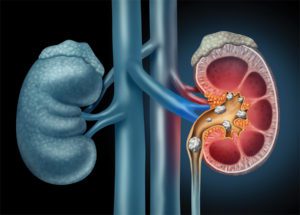 A: Ten percent of people will be affected by kidney stones in their lifetime.
A: Ten percent of people will be affected by kidney stones in their lifetime.
Q: If I have a kidney stone, will I be able to pass it without surgery?
A: Stone passage depends directly on the size of the stone. With the assistance of specific medications, stones that are 4mm or less have a good chance of passing. Stones greater than 4mm usually require intervention.
Q: Can eating too much dairy a cause of kidney stones?
A: While excessive dietary calcium intake can contribute to the formation of stones, it is rarely the sole source of stone formation.
Q: If I have gout, will I have kidney stones too?
A: The build up of uric acid in the blood stream and joints causes the symptoms of gout. The uric acid in the bloodstream is filtered by the kidneys and can put those with gout at risk of kidney stone formation.
Q: If I have kidney stones, do I have to have major surgery to remove them?
A: No, there are many minimally invasive (no incision) surgical approaches to stones including shockwave treatment and endoscopic (miniature telescope) treatment of stones are routinely performed as same day, outpatient surgery.
Q: How can I prevent kidney stones from coming back?
A: Once the stone is treated or has passed, a metabolic evaluation including simple blood work, chemical analysis of the stone and 24 hour urine collection can direct medication and dietary treatments that can achieve up to 90% stone free rates.
Q: How can I prevent kidney stones from coming back?
A: Once the stone is treated or has passed, a metabolic evaluation including simple blood work, chemical analysis of the stone and 24 hour urine collection can direct medication and dietary treatments that can achieve up to 90% stone free rates.
Q: How much water do I need to drink to prevent kidney stones?
A: Ideally, to prevent further kidney stone formation, fluid intake should be tailored to produce a minimum of 2 liters of urine per day.
Q: Is it true that by changing the pH of my urine can prevent stone formation?
A: Yes, certain types of stones (uric acid) can be prevented and even dissolved by alkalinizing (raising the pH) of the urine to a range between 6.5 to 7.
Q: Do I really need to see a urologist if I have only had one episode of kidney stones?
A: Yes, all patients who have had even a single stone, need to have appropriate evaluation in order to develop a proper strategy for further stone prevention.
Q: Are there specific things I should avoid in my diet or add to my diet to prevent stones?
A: Depending on the chemical make up of the stone, there are specific dietary restrictions that can prevent further stones. In general, decreasing salt intake and increasing dietary citrate with fresh lemon, lime, orange or pineapple juice can also inhibit stone formation.
Florida Urology Specialists
1 South School Avenue, Ste. 200, Sarasota, Florida 34237
Office: 941.309.7000 / Toll Free: 800.543.2809
Fax: 941.309.7012







